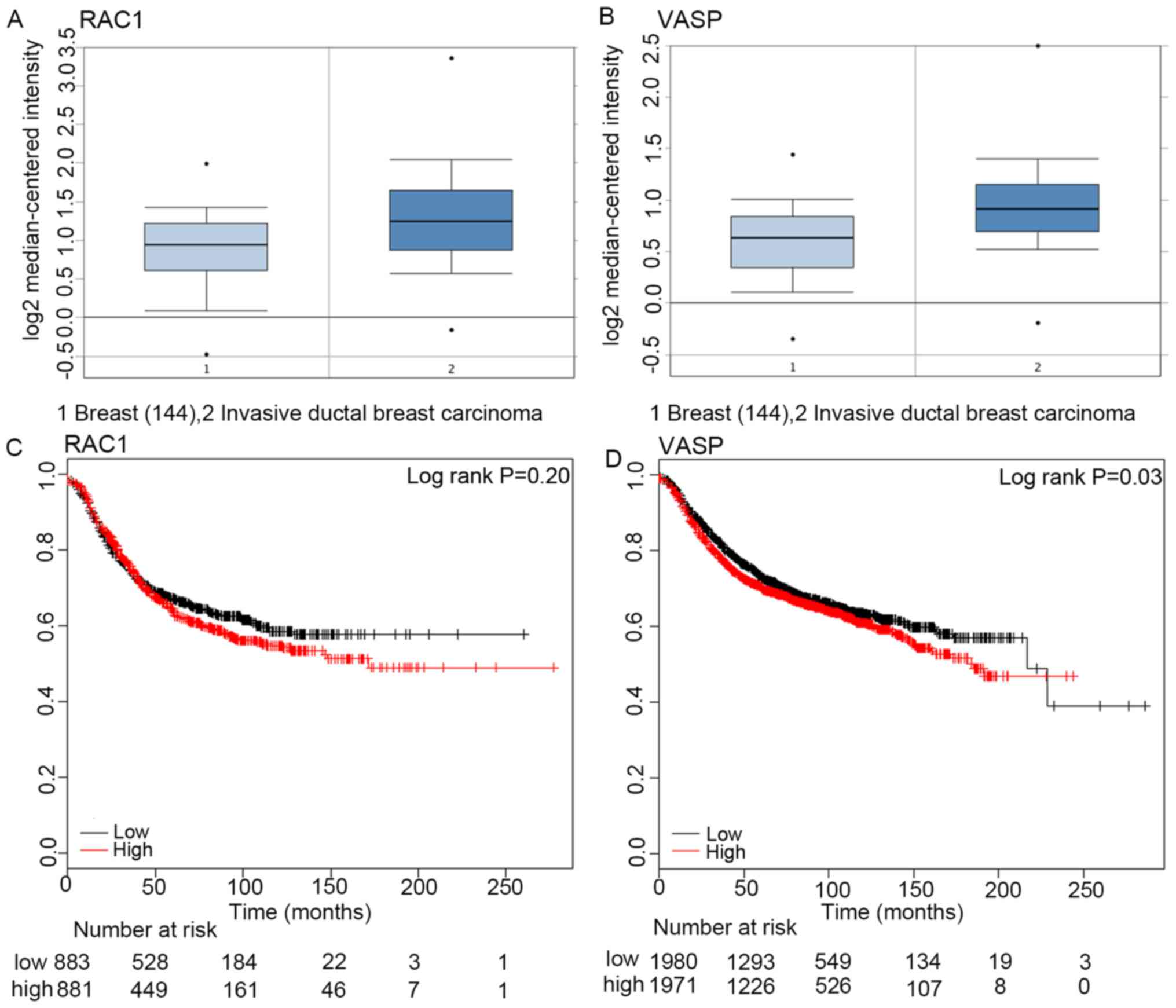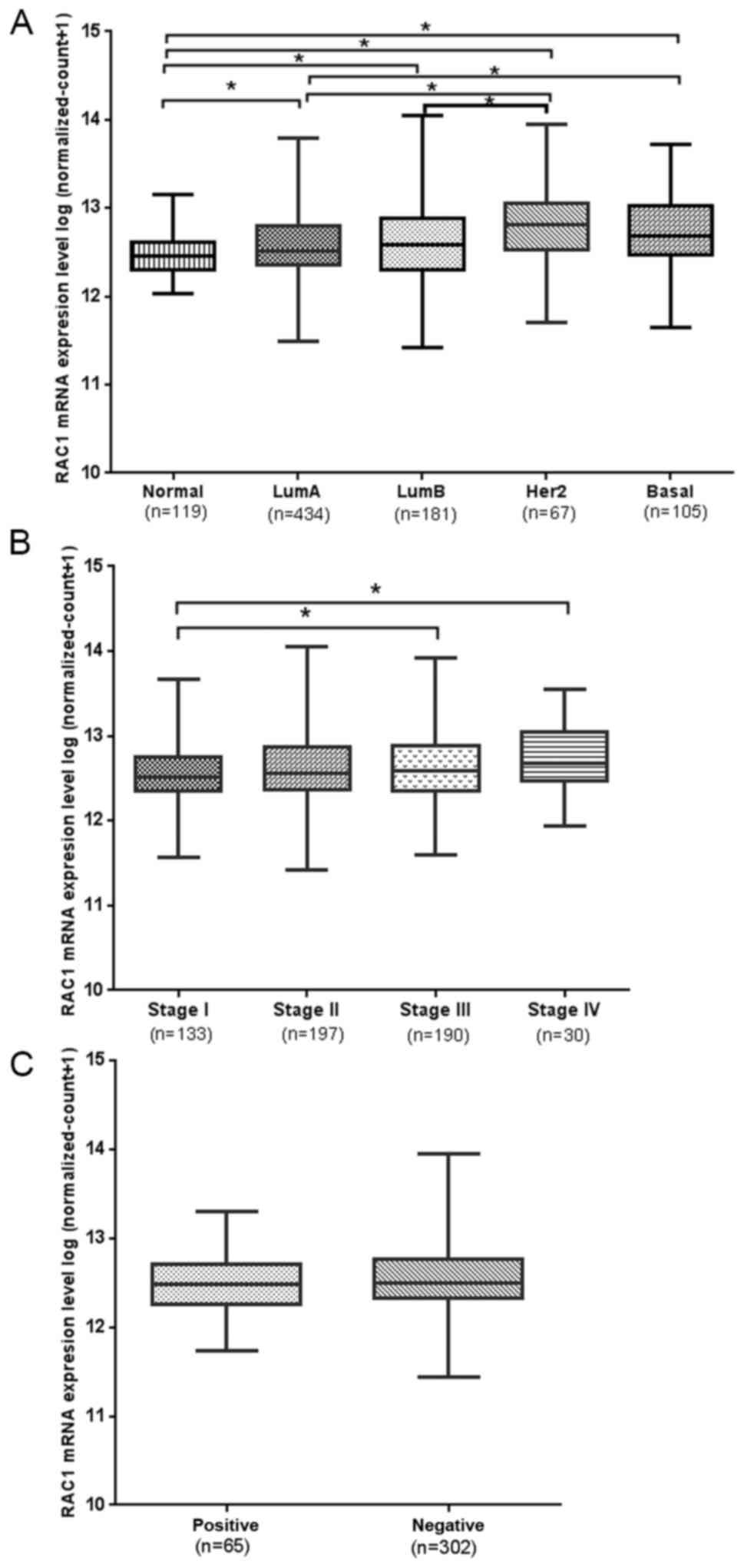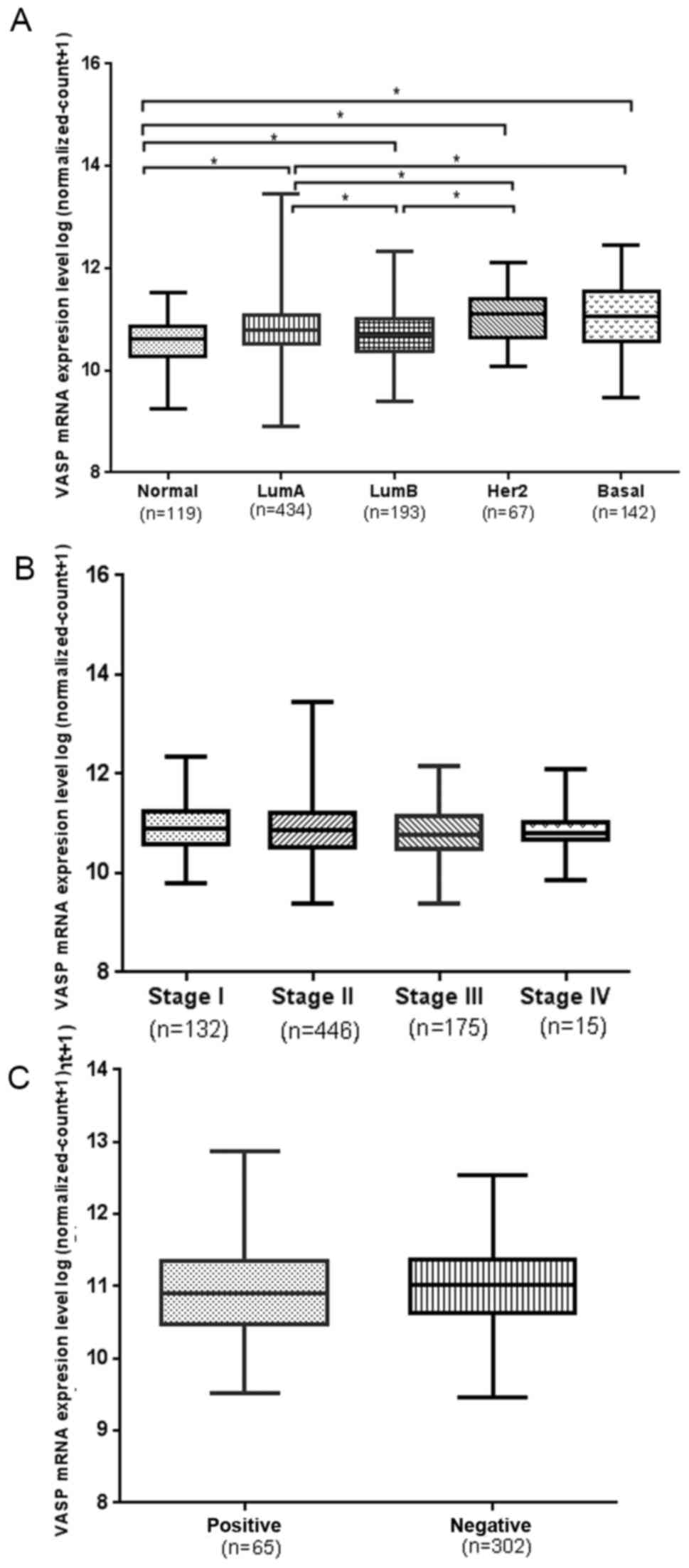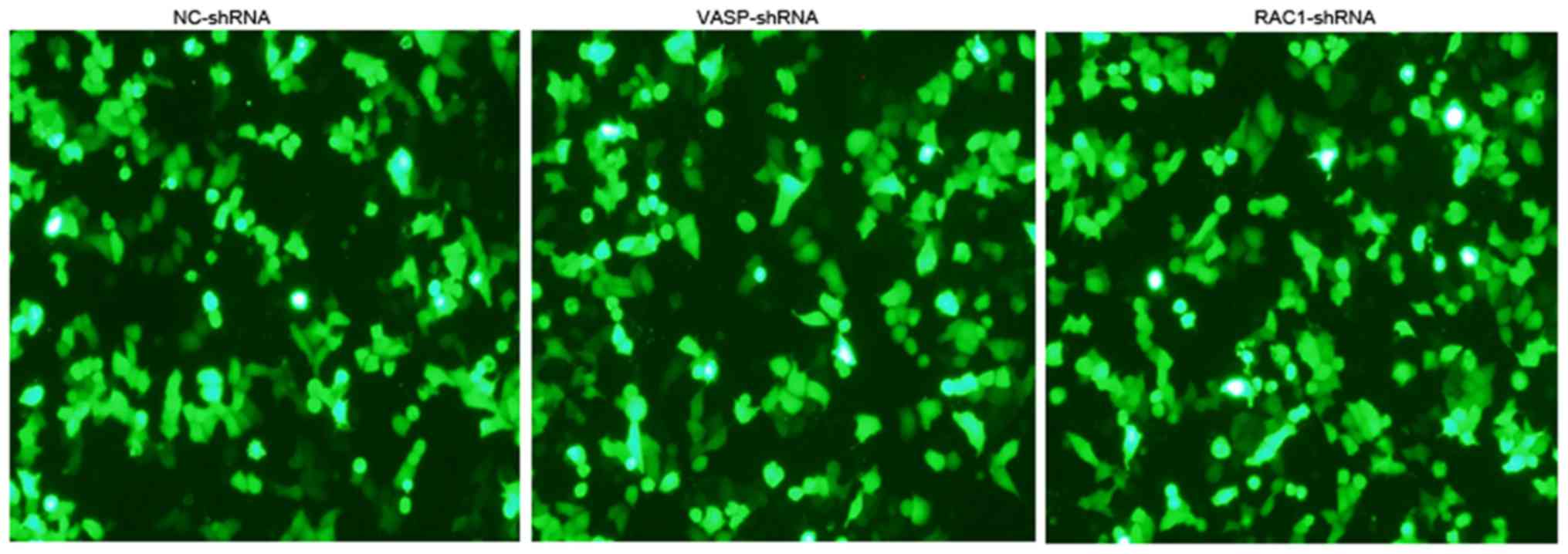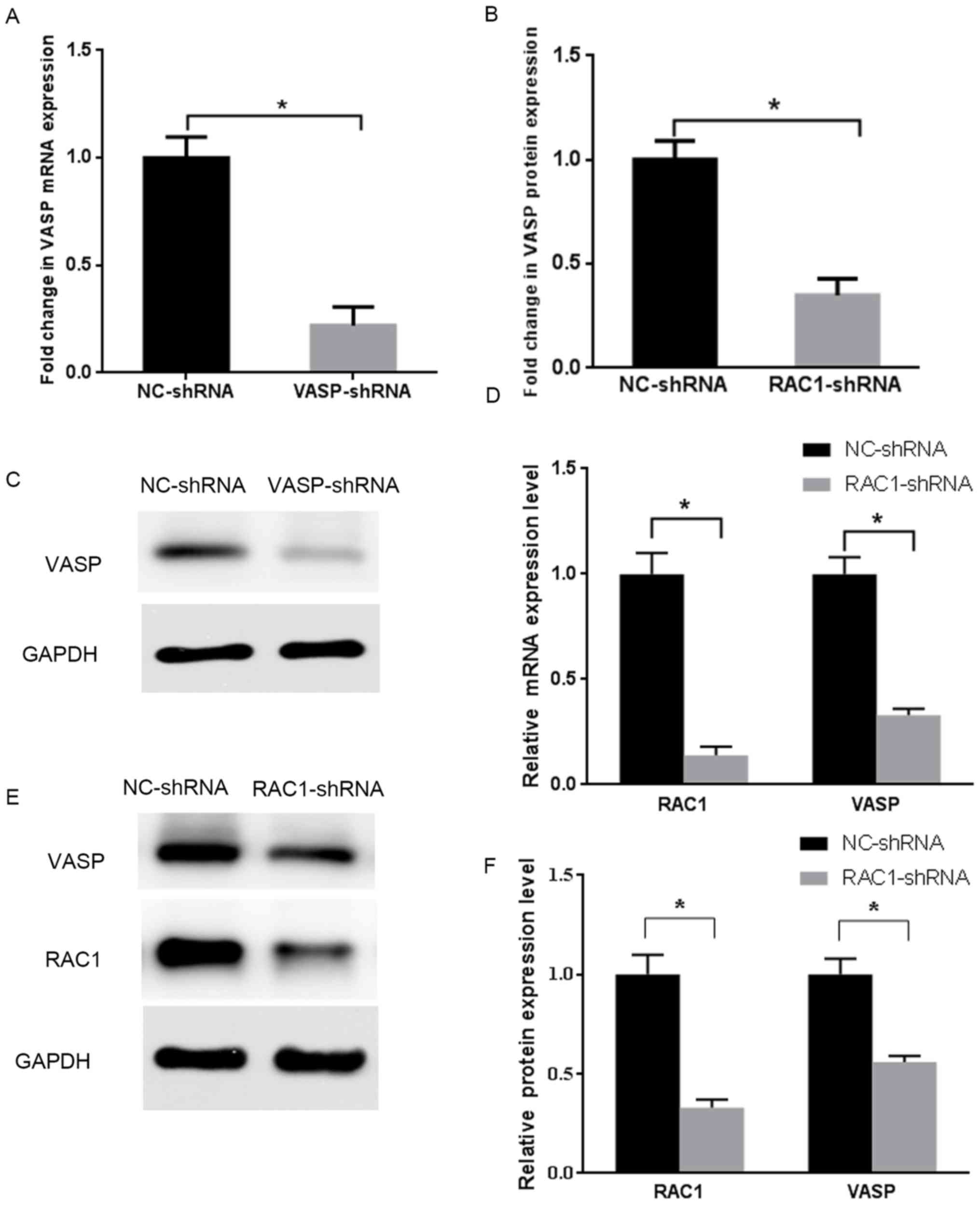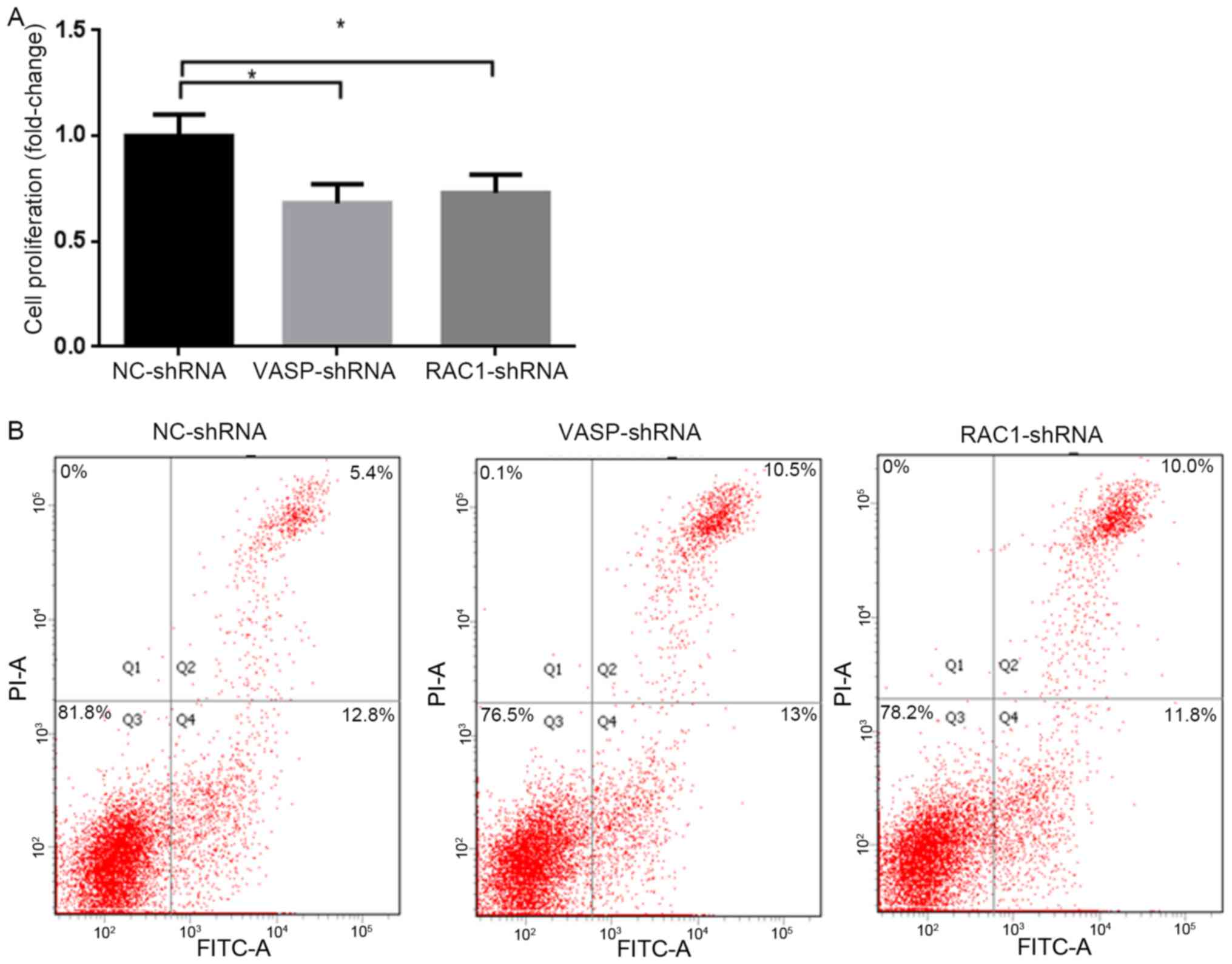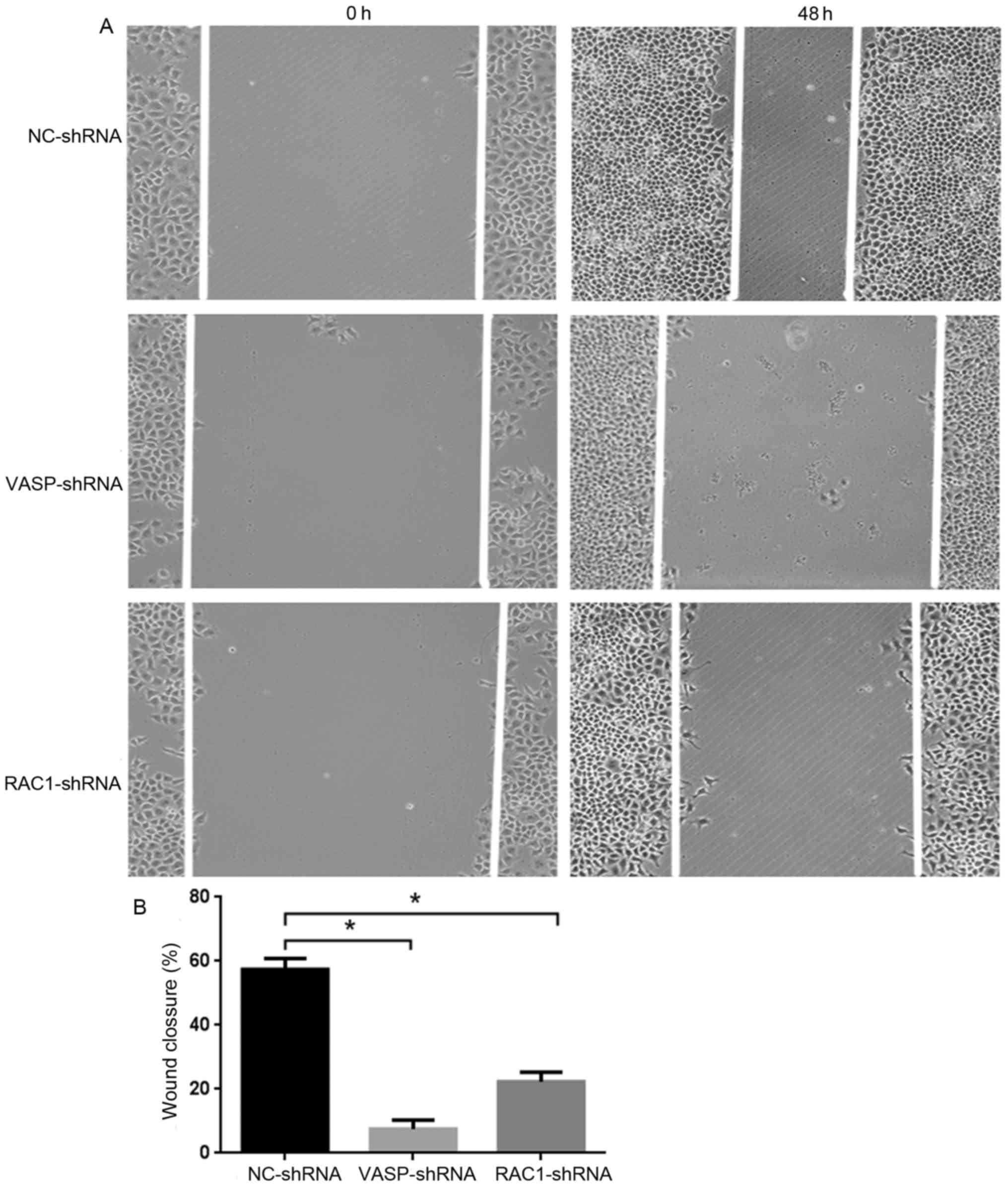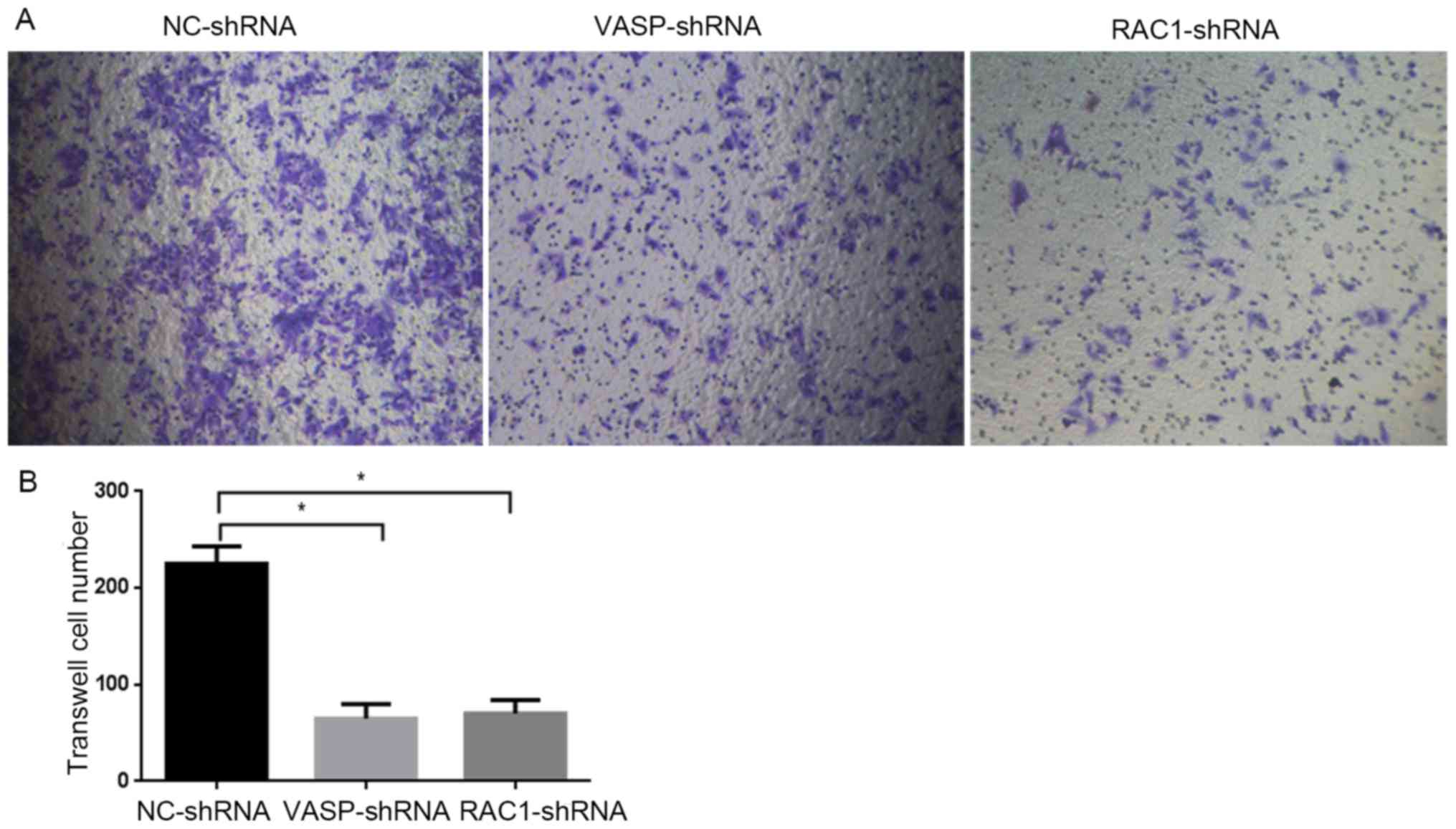|
1
|
Chen W, Zheng R, Baade PD, Zhang S, Zeng
H, Bray F, Jemal A, Yu XQ and He J: Cancer statistics in China,
2015. CA Cancer J Clin. 66:115–132. 2016. View Article : Google Scholar : PubMed/NCBI
|
|
2
|
Lopez-Marure R, Contreras PG and Dillon
JS: Effects of dehydroepiandrosterone on proliferation, migration,
and death of breast cancer cells. Eur J Pharmacol. 660:268–274.
2011. View Article : Google Scholar : PubMed/NCBI
|
|
3
|
Krause M, Dent EW, Bear JE, Loureiro JJ
and Gertler FB: Ena/VASP proteins: Regulators of the actin
cytoskeleton and cell migration. Annu Rev Cell Dev Biol.
19:541–564. 2003. View Article : Google Scholar : PubMed/NCBI
|
|
4
|
Ali M, Rogers LK and Pitari GM: Serine
phosphorylation of vasodilator-stimulated phosphoprotein (VASP)
regulates colon cancer cell survival and apoptosis. Life Sci.
123:1–8. 2015. View Article : Google Scholar : PubMed/NCBI
|
|
5
|
Pula G and Krause M: Role of Ena/VASP
proteins in homeostasis and disease. Handb Exp Pharmacol. 39–65.
2008. View Article : Google Scholar : PubMed/NCBI
|
|
6
|
Sechi AS and Wehland J: ENA/VASP proteins:
Multifunctional regulators of actin cytoskeleton dynamics. Front
Biosci. 9:1294–1310. 2004. View
Article : Google Scholar : PubMed/NCBI
|
|
7
|
Jayakumar T, Lin KC, Lu WJ, Lin CY,
Pitchairaj G, Li JY and Sheu JR: Nobiletin, a citrus flavonoid,
activates vasodilator-stimulated phosphoprotein in human platelets
through non-cyclic nucleotide-related mechanisms. Int J Mol Med.
39:174–182. 2017. View Article : Google Scholar : PubMed/NCBI
|
|
8
|
Dertsiz L, Ozbilim G, Kayisli Y, Gokhan
GA, Demircan A and Kayisli UA: Differential expression of VASP in
normal lung tissue and lung adenocarcinomas. Thorax. 60:576–581.
2005. View Article : Google Scholar : PubMed/NCBI
|
|
9
|
Cardama GA, Gonzalez N, Maggio J, Menna PL
and Gomez DE: Rho GTPases as therapeutic targets in cancer
(Review). Int J Oncol. 51:1025–1034. 2017. View Article : Google Scholar : PubMed/NCBI
|
|
10
|
Orgaz JL, Herraiz C and Sanz-Moreno V: Rho
GTPases modulate malignant transformation of tumor cells. Small
GTPases. 5:e290192014. View Article : Google Scholar : PubMed/NCBI
|
|
11
|
Kazanietz MG and Caloca MJ: The Rac GTPase
in cancer: From old concepts to new paradigms. Cancer Res.
77:5445–5451. 2017. View Article : Google Scholar : PubMed/NCBI
|
|
12
|
Zuzga DS, Pelta-Heller J, Li P, Bombonati
A, Waldman SA and Pitari GM: Phosphorylation of
vasodilator-stimulated phosphoprotein Ser239 suppresses filopodia
and invadopodia in colon cancer. Int J Cancer. 130:2539–2548. 2012.
View Article : Google Scholar : PubMed/NCBI
|
|
13
|
Espina C, Céspedes MV, García-Cabezas MA,
del Pulgar Gómez MT, Boluda A, Oroz LG, Benitah SA, Cejas P, Nistal
M, Mangues R and Lacal JC: A critical role for Rac1 in tumor
progression of human colorectal adenocarcinoma cells. Am J Pathol.
172:156–166. 2008. View Article : Google Scholar : PubMed/NCBI
|
|
14
|
Fryer BH, Wang C, Vedantam S, Zhou GL, Jin
S, Fletcher L, Simon MC and Field J: cGMP-dependent protein kinase
phosphorylates p21-activated kinase (Pak) 1, inhibiting Pak/Nck
binding and stimulating Pak/vasodilator-stimulated phosphoprotein
association. J Biol Chem. 281:11487–11495. 2006. View Article : Google Scholar : PubMed/NCBI
|
|
15
|
Györffy B, Lanczky A, Eklund AC, Denkert
C, Budczies J, Li Q and Szallasi Z: An online survival analysis
tool to rapidly assess the effect of 22,277 genes on breast cancer
prognosis using microarray data of 1,809 patients. Breast Cancer
Res Treat. 123:725–731. 2010. View Article : Google Scholar : PubMed/NCBI
|
|
16
|
Parker JS, Mullins M, Cheang MC, Leung S,
Voduc D, Vickery T, Davies S, Fauron C, He X, Hu Z, et al:
Supervised risk predictor of breast cancer based on intrinsic
subtypes. J Clin Oncol. 27:1160–1167. 2009. View Article : Google Scholar : PubMed/NCBI
|
|
17
|
Ye J, Wang W, Xu L, Duan X, Cheng Y, Xin
L, Zhang H, Zhang S, Li T and Liu Y: A retrospective prognostic
evaluation analysis using the 8th edition of American Joint
Committee on Cancer (AJCC) cancer staging system for luminal A
breast cancer. Chin J Cancer Res. 29:351–360. 2017. View Article : Google Scholar : PubMed/NCBI
|
|
18
|
Penault-Llorca F: Comments on the new
American Joint Committee on Cancer TNM staging for breast cancer.
What's new for the pathologist? Ann Pathol. 23:492–495. 2003.(In
French). PubMed/NCBI
|
|
19
|
Aznar S and Lacal JC: Rho signals to cell
growth and apoptosis. Cancer Lett. 165:1–10. 2001. View Article : Google Scholar : PubMed/NCBI
|
|
20
|
Bar-Sagi D and Hall A: Ras and Rho
GTPases: A family reunion. Cell. 103:227–238. 2000. View Article : Google Scholar : PubMed/NCBI
|
|
21
|
Schaefer A, Reinhard NR and Hordijk PL:
Toward understanding RhoGTPase specificity: Structure, function and
local activation. Small GTPases. 5:62014. View Article : Google Scholar : PubMed/NCBI
|
|
22
|
Zandvakili I, Lin Y, Morris JC and Zheng
Y: Rho GTPases: Anti- or pro-neoplastic targets? Oncogene.
36:3213–3222. 2017. View Article : Google Scholar : PubMed/NCBI
|
|
23
|
Hall A: Rho GTPases and the actin
cytoskeleton. Science. 279:509–514. 1998. View Article : Google Scholar : PubMed/NCBI
|
|
24
|
Roux P, Gauthier-Rouviere C, Doucet-Brutin
S and Fort P: The small GTPases Cdc42Hs, Rac1 and RhoG delineate
Raf-independent pathways that cooperate to transform NIH3T3 cells.
Curr Biol. 7:629–637. 1997. View Article : Google Scholar : PubMed/NCBI
|
|
25
|
Cuiyan Z, Jie H, Fang Z, Kezhi Z, Junting
W, Susheng S, Xiaoli F, Ning L, Xinhua M, Zhaoli C, et al:
Overexpression of RhoE in non-small cell lung cancer (NSCLC) is
associated with smoking and correlates with DNA copy number
changes. Cancer Biol Ther. 6:335–342. 2007. View Article : Google Scholar : PubMed/NCBI
|
|
26
|
Kamai T, Shirataki H, Nakanishi K, Furuya
N, Kambara T, Abe H, Oyama T and Yoshida K: Increased Rac1 activity
and Pak1 overexpression are associated with lymphovascular invasion
and lymph node metastasis of upper urinary tract cancer. BMC
Cancer. 10:1642010. View Article : Google Scholar : PubMed/NCBI
|
|
27
|
Li YL, Shao M and Shi DL: Rac1 signalling
coordinates epiboly movement by differential regulation of actin
cytoskeleton in zebrafish. Biochem Biophys Res Commun.
490:1059–1065. 2017. View Article : Google Scholar : PubMed/NCBI
|
|
28
|
Lim KB, Bu W, Goh WI, Koh E, Ong SH,
Pawson T, Sudhaharan T and Ahmed S: The Cdc42 effector IRSp53
generates filopodia by coupling membrane protrusion with actin
dynamics. J Biol Chem. 283:20454–20472. 2008. View Article : Google Scholar : PubMed/NCBI
|
|
29
|
Dawid IB, Breen JJ and Toyama R: LIM
domains: Multiple roles as adapters and functional modifiers in
protein interactions. Trends Genet. 14:156–162. 1998. View Article : Google Scholar : PubMed/NCBI
|
|
30
|
Edwards DC, Sanders LC, Bokoch GM and Gill
GN: Activation of LIM-kinase by Pak1 couples Rac/Cdc42 GTPase
signalling to actin cytoskeletal dynamics. Nat Cell Biol.
1:253–259. 1999. View
Article : Google Scholar : PubMed/NCBI
|
|
31
|
Zhang YT, Xu LH, Lu Q, Liu KP, Liu PY, Ji
F, Liu XM, Ouyang DY and He XH: VASP activation via the
Gα13/RhoA/PKA pathway mediates cucurbitacin-B-induced actin
aggregation and cofilin-actin rod formation. PLoS One.
9:e935472014. View Article : Google Scholar : PubMed/NCBI
|
|
32
|
Gurzu S, Ciortea D, Ember I and Jung I:
The possible role of Mena protein and its splicing-derived variants
in embryogenesis, carcinogenesis, and tumor invasion: A systematic
review of the literature. Biomed Res Int. 2013:3651922013.
View Article : Google Scholar : PubMed/NCBI
|
|
33
|
Wu G, Wei L, Yu A, Zhang M, Qi B, Su K, Hu
X and Wang J: Vasodilator-stimulated phosphoprotein regulates
osteosarcoma cell migration. Oncol Rep. 26:1609–1615.
2011.PubMed/NCBI
|
|
34
|
Liu K, Li L, Nisson PE, Gruber C, Jessee J
and Cohen SN: Reversible tumorigenesis induced by deficiency of
vasodilator-stimulated phosphoprotein. Mol Cell Biol. 19:3696–3703.
1999. View Article : Google Scholar : PubMed/NCBI
|
|
35
|
Greenwood AI, Kwon J and Nicholson LK:
Isomerase-catalyzed binding of interleukin-1 receptor-associated
kinase 1 to the EVH1 domain of vasodilator-stimulated
phosphoprotein. Biochemistry. 53:3593–3607. 2014. View Article : Google Scholar : PubMed/NCBI
|















